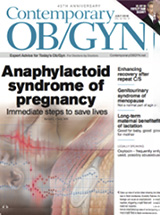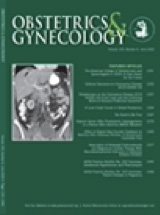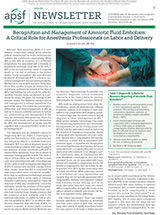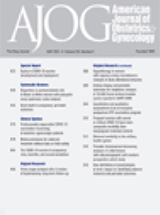Registry & Biorepository
One of the primary objectives of the AFE Foundation is to advance research of amniotic fluid embolism (AFE) to elucidate the etiology and pathophysiology of AFE. Through this understanding we hope to establish an effective treatment, mechanism for predictability, and a gold standard diagnostic test.
Together, with a team of multidisciplinary expert researchers from various universities the AFE Registry and Biorepository was established in 2012.
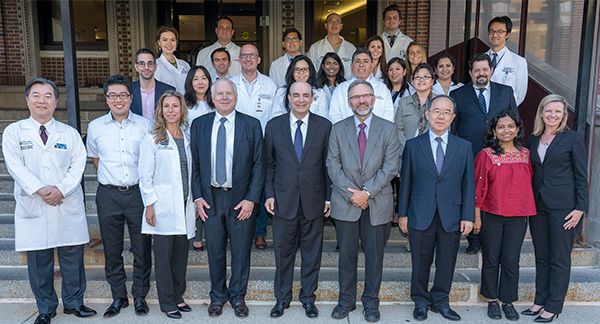
The AFE Registry is a collection of data derived from medical charts and interviews from AFE patients and surviving family members. This comprehensive collection of information allows for deeper understanding into individual cases of AFE and allows researchers the ability to gather vital information on the efficacy of treatments, reproductive and long-term health of survivors of AFE, and also serves as a basis for clinical research. To date, this registry has resulted in 13 publications that describe the clinical findings of typical and atypical forms of AFE, reproductive decisions, recurrence, and proposed diagnostic criteria for AFE.
Leading AFE expert and researcher, Steven Clark, stated in his widely cited manuscript,
The greatest opportunity to advance our understanding of this condition is to support the efforts of the AFE Foundation’s AFE Patient Registry and Biorepository. [1]
The AFE Biorepository was established to allow for the collection, storage, and examination of blood and tissues from AFE patients which are needed to help transform this syndrome into a predictable, preventable, and treatable condition. Considerable focus is on the identification of mechanisms of disease and the biomarkers responsible for this syndrome.
The AFE Registry and Biorepository reside at the University of Texas Health Science Center / McGovern Medical School in Houston, Texas, and is overseen by Primary Investigator, Dr. Irene Stafford, MD. Director of Research, Sunbola Ashimi, Ph.D., and Co-Investigator, Miranda Klassen.
Learn more about our research efforts at ClinicalTrials.gov.
URGENT NEED FOR SPECIMENS
Blood tests taken before and during an AFE event may hold the key to unlocking the mystery of AFE.

Diagnostic Criteria
One of our most successful endeavors was helping establish a uniform diagnostic criteria to be used for research publication purposes. The intent is to help focus efforts on publications where all of the included cases meet the classic definition of AFE which includes the presence of hemodynamic and respiratory compromise accompanied by strictly defined disseminated intravascular coagulopathy. It is our hope that by limiting research reports involving amniotic fluid embolism to women who meet these criteria will enhance the validity of published data and assist in the identification of risk factors, effective treatments, and possibly useful biomarkers for this condition.
This study has received IRB approval in accordance with federal regulations set forth by the U.S. Department of Health and Human Services. For more information about this research visit Clinical Trials.gov or contact us.
Published Abstracts and Articles
Proposed diagnostic criteria for the case definition of amniotic fluid embolism in research studies
Clark SL, Romero R, Dildy GA, D’Alton ME, Foley M, Pacheco LD, Belfort MA, et al. Am J Obstet Gynecol. 2016 Oct;215(4):408-12. doi: 10.1016/j.ajog.2016.06.037. Epub 2016 Jun 29.
Analysis of the United States International Registry
IA Stafford, GA Dildy, Miranda Klassen, et al. (2020) Amniotic fluid embolism syndrome: American Journal of Obstetrics & Gynecology MFM.
Differences in clinical presentation and outcomes between women with typical versus atypical amniotic fluid embolism
Stafford, I., Clark, S., Klassen, M., et al. (2020) American Journal of Obstetrics & Gynecology, Volume 221, Issue 1 , S223-S224 (331)
Amniotic fluid embolism: principles of early clinical management
Pacheco, Luis D, Clark, SL, Klassen, M., Hankins, G. (2020) American Journal of Obstetrics & Gynecology.
The prevalence of placenta previa in pregnancies complicated by amniotic fluid embolism
Berra, Alexandra L., Klassen, M., Stafford, IA. et al (2019) American Journal of Obstetrics & Gynecology, Volume 220 , Issue 1 , S101 – S102 (130)
Evaluation of proposed criteria for research reporting of amniotic fluid embolism
Stafford, IA, Amirhossein M., Dildy, G., Klassen, M., Belfort, MA., Romero, R., Clark, SL. (2019) American Journal of Obstetrics & Gynecology, Volume 220, Issue 3, 285-287
Diagnostic precision of proposed criteria for research reporting of amniotic fluid embolism.
Stafford, IA, Klassen, M. (2018) American Journal of Obstetrics & Gynecology, Volume 218 , Issue 1 , S122 – S123 (180)
The misdiagnosis of amniotic fluid embolism.
Stafford, IA, Klassen, M. (2018) American Journal of Obstetrics & Gynecology, Volume 218 , Issue 1 , S122 (179)
The risk of amniotic fluid embolism recurrence in subsequent pregnancy.
Stafford, IA, Klassen, M. (2018) American Journal of Obstetrics & Gynecology, Volume 218 , Issue 1 , S121 (177)
Reproductive decisions after the diagnosis of amniotic fluid embolism.
Amirhossein Moaddab, Miranda Klassen, Steven L. Clark, Gary A. Dildy European Journal of Obstetrics & Gynecology and Reproductive Biology 211 33–36, 2017

